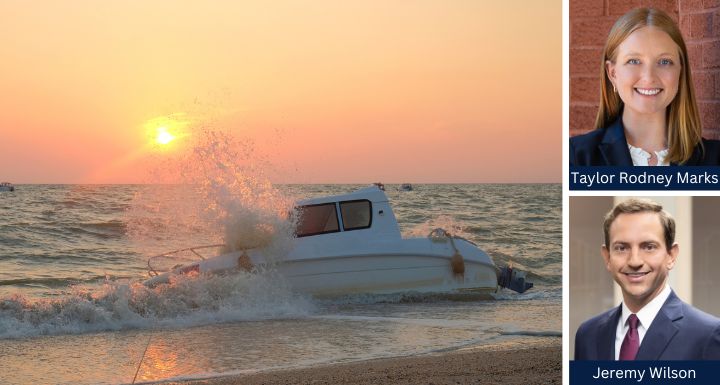What Causes The Most Boating Accidents

What Causes The Most Boating Accidents in North Carolina?
“As a personal injury attorney in Wilmington, North Carolina, I’ve represented people who have been victims of boating accidents. While I love being on the water, I’ve witnessed firsthand the unique challenges and risks associated with boating in North Carolina’s diverse waterways,” shares personal injury attorney and co-author Jeremy Wilson.
From the expansive coastline of the Outer Banks to the serene lakes nestled in the mountains, North Carolina offers a wide range of boating opportunities for enthusiasts. However, amidst the beauty and excitement of boating in the Tar Heel State, there are inherent risks that must be addressed to ensure the safety of everyone on the water.
North Carolina boasts over 12,000 miles of navigable waters, including offshore, canal, lake, river, and intracoastal waterways, providing boaters with a diverse array of environments to explore.
Each of these water bodies presents its own set of challenges and considerations for boaters, from navigating shoals along the coast to avoiding submerged hazards in inland lakes and rivers. Understanding the unique characteristics of each waterway and practicing responsible boating practices is essential for minimizing the risk of accidents and injuries.
Primary Cause of Boating Accidents
Operator Inexperience
One of the primary causes of boat collisions in North Carolina, as in many other regions, is operator error.
Just like in car accidents, human mistakes play a significant role in many boating incidents. Whether it’s distracted driving, speeding, or operating under the influence of alcohol or drugs, negligent behavior by boat operators can lead to devastating collisions on the water.
Alcohol Use
According to the U.S. Coast Guard’s Recreational Boating Statistics, alcohol use is the leading known contributing factor in fatal boating accidents, accounting for a significant portion of boating-related fatalities each year.
Moreover, operator inattention, improper lookout, and operator inexperience are among the top five primary contributing factors in boating accidents, according to the same statistics. These factors highlight the critical importance of attentive and responsible boating practices to prevent collisions and protect the safety of everyone on the water.
Poor Visibility
Poor visibility is another frequent contributing factor in boating accidents, particularly in coastal regions like North Carolina, where fog, rain, and darkness can obscure navigational markers and other vessels.
Limited visibility increases the risk of collisions and can result in serious injuries such as head trauma, internal injuries, and drowning, especially if victims are thrown overboard or trapped in submerged vessels. Boaters should always monitor weather forecasts and conditions before heading out on the water, and should exercise caution when visibility is reduced.
Violation of Navigation Rules
Navigation errors also play a significant role in boating collisions, as I’ve emphasized to my clients. Inexperienced or careless operators may fail to yield to oncoming vessels, misinterpret navigational aids, or navigate too close to shore, leading to dangerous situations on the water.
Collisions resulting from navigation errors can cause a range of injuries, from cuts and bruises to more severe injuries such as broken bones, traumatic brain injuries, and even loss of limb. To mitigate the risk of navigation-related accidents, boaters should familiarize themselves with local navigation regulations and take boating safety courses to improve their skills and knowledge.
Mechanical Failures
Mechanical failures can also lead to boating collisions, although they are less common compared to human error or environmental factors. Malfunctions in a boat’s propulsion system, steering mechanism, or other critical components can compromise the vessel’s maneuverability and increase the risk of collision with other boats or stationary objects.
Regular maintenance and inspections are essential for preventing mechanical failures and ensuring the safety of boaters in North Carolina’s diverse boating environments. Additionally, boaters should always carry emergency equipment such as radios, flares, and fire extinguishers onboard in case of mechanical emergencies or other unforeseen circumstances.
Weather Conditions
Weather conditions, such as rough seas, strong winds, and sudden storms, can create hazardous conditions for boaters and increase the likelihood of collisions. Adverse weather conditions can reduce visibility, impair vessel handling, and make it difficult for operators to maintain control of their boats, leading to accidents with serious injuries such as hypothermia, near-drowning, and blunt force trauma.
Boaters should always check weather forecasts before heading out on the water and avoid boating in inclement weather whenever possible.
Water Hazards
Obstacles in the water, including submerged hazards such as sandbars, rocks, and debris pose a significant threat to boaters and can lead to collisions if not properly identified and avoided.
Collisions with submerged objects can cause extensive damage to a boat and result in injuries such as broken bones, head injuries, and internal injuries, particularly if victims are thrown from the vessel or struck by flying debris.
Boaters should exercise caution when navigating unfamiliar waters and rely on navigational aids such as depth sounders and charts to identify potential hazards and avoid collisions.
Communication
Lack of communication among boaters can also contribute to collisions on the water. Failure to signal intentions, respond to radio communications, or adhere to established navigation rules can lead to misunderstandings and potentially dangerous situations. Remember, “Red Right Returning” helps everyone on the water.
Injuries resulting from communication failures can range from minor cuts and bruises to more severe injuries such as spinal cord injuries, amputations, and wrongful death. Boaters should always maintain a proper lookout and communicate effectively with other vessels to avoid collisions and ensure the safety of everyone on the water.
Swimming and Diving
Swimming and diving injuries frequently occur while boating, so captains must be certain those on board know the depth of the waters. Boaters should not be allowed to dive in unfamiliar water if a sandbar or shallow area is beneath the boat. Spinal injuries from diving in shallow water can be catastrophic and are not unheard of in the waters of Eastern North Carolina.
Legal Claims
Under North Carolina’s civil law and that of other jurisdictions, everyone has a duty to act with reasonable care in all their actions. When operating a boat, this requires driving carefully, including at the appropriate speed. The duty of reasonable care also can require not operating a boat that one knows is unsafe, or that one reasonably should know is unsafe. If someone breaches these and related duties, they maybe liable for all damages caused by their negligence.
Boating accident cases are somewhat unique compared to other personal injury claims in North Carolina because federal law often applies. Federal maritime law applies to injuries that occur on navigable waters that are used or capable of being used for interstate or foreign commerce. Navigable water isn’t limited to just the ocean, but also can include waterways and other bodies of water such as harbors, rivers, and lakes. Federal maritime law will apply to nearly all accidents in these cases—including those involving recreational boating. Maritime law can even apply to an injury that occurs on land if there is a sufficient nexus between the maritime activity and the on-land injury.
Thus, boating accidents can present very complex legal issues requiring the involvement of a skilled attorney.
Contact A Boat Accident Attorney Today
In conclusion, boating accidents can have serious consequences for victims and their families, resulting in a wide range of injuries and damages. Understanding the causes of these accidents, the potential ramifications for victims, and the importance of boating safety measures is essential for preventing accidents and seeking legal recourse for those harmed.
By practicing attentive and responsible boating practices, boaters can minimize the risk of collisions and protect the safety of everyone on the water.
—
© 2024 Ward and Smith, P.A. For further information regarding the issues described above, please contact Jeremy Wilson.
This article is not intended to give, and should not be relied upon for, legal advice in any particular circumstance or fact situation. No action should be taken in reliance upon the information contained in this article without obtaining the advice of an attorney.
We are your established legal network with offices in Asheville, Greenville, New Bern, Raleigh, and Wilmington, NC.
Featured News
View All
